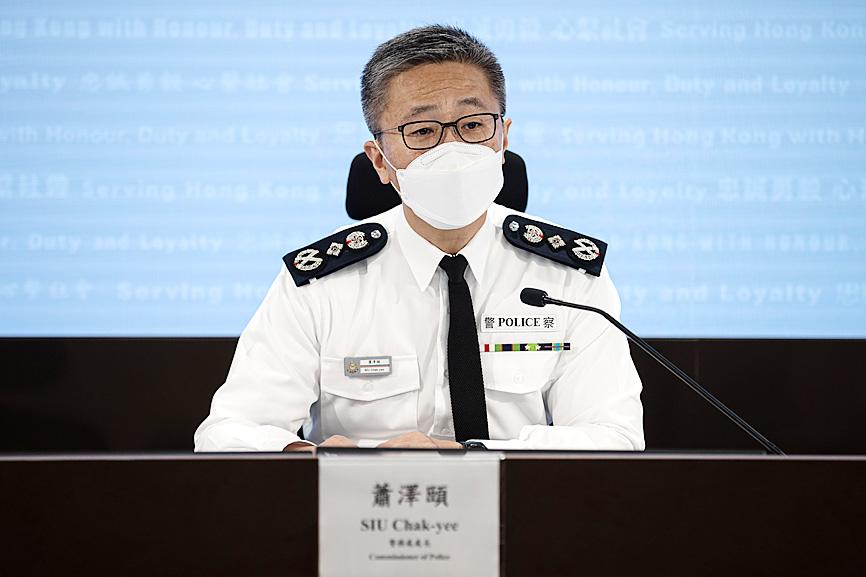A UK-based rights group yesterday pledged not to remain silent after the Hong Kong government demanded it shutter its Web site and accused it of endangering China’s national security.
While China heavily restricts the Internet on the mainland, Hong Kong does not generally censor the Web, allowing residents to access sites and content that might be critical of Beijing. However, yesterday’s announcement makes Hong Kong Watch the first overseas non-governmental organization (NGO) to confirm it is in the crosshairs of a National Security Law that Beijing imposed on June 30, 2020, to snuff out dissent in the territory.
“By threatening a UK-based NGO with financial penalties and jail for merely reporting on the human rights situation in Hong Kong, this letter exemplifies why Hong Kong’s National Security Law is so dangerous,” Hong Kong Watch chief executive Benedict Rogers said.

Photo: EPA-EFE
“We will not be silenced by an authoritarian security apparatus which, through a mixture of senseless brutality and ineptitude, has triggered rapid mass migration out of the city and shut down civil society,” said Rogers, who was barred from visiting Hong Kong in 2017.
The Hong Kong Security Bureau accused the group of “colluding with foreign forces to endanger national security,” according to an e-mail sent on Thursday last week, which Hong Kong Watch posted in full on its Web site yesterday.
The offense, one of the four major crimes under the security law, can carry maximum penalties of up to life imprisonment.
“Criminal investigation reveals that ‘Hong Kong Watch’ has been engaging in ... lobbying foreign countries to impose sanctions or blockade” against China and Hong Kong, the e-mail said.
Hong Kong Police Commissioner Raymond Siu Chak-yee (蕭澤頤) also sent a notice the same day demanding that the group remove all publications from its Web site.
“Should you fail to do so, further action will be instituted ... without further notice,” the e-mail said.
The Hong Kong Police force yesterday said that it does not comment on specific cases, but added that the public can continue to use the Internet “lawfully.”
The UK — Hong Kong’s former colonial ruler — condemned what it called the “unjustifiable action.”
“The Chinese Government and Hong Kong authorities must respect the universal right to freedom of speech, and uphold that right in Hong Kong in accordance with international commitments, including the [Sino-British] Joint Declaration,” British Secretary of State for Foreign, Commonwealth and Development Affairs Liz Truss said in a statement.
“Attempting to silence voices globally that speak up for freedom and democracy is unacceptable and will never succeed,” the statement said.
Founded in 2017, Hong Kong Watch monitors “threats to Hong Kong’s basic freedoms, the rule of law and autonomy.”
The NGO is supported by a number of British politicians, including former Hong Kong governor Chris Patten.
Since last month, the Web site has not been accessible in the Chinese territory without the use of a virtual private network.

SECURITY: As China is ‘reshaping’ Hong Kong’s population, Taiwan must raise the eligibility threshold for applications from Hong Kongers, Chiu Chui-cheng said When Hong Kong and Macau citizens apply for residency in Taiwan, it would be under a new category that includes a “national security observation period,” Mainland Affairs Council (MAC) Minister Chiu Chui-cheng (邱垂正) said yesterday. President William Lai (賴清德) on March 13 announced 17 strategies to counter China’s aggression toward Taiwan, including incorporating national security considerations into the review process for residency applications from Hong Kong and Macau citizens. The situation in Hong Kong is constantly changing, Chiu said to media yesterday on the sidelines of the Taipei Technology Run hosted by the Taipei Neihu Technology Park Development Association. With

CARROT AND STICK: While unrelenting in its military threats, China attracted nearly 40,000 Taiwanese to over 400 business events last year Nearly 40,000 Taiwanese last year joined industry events in China, such as conferences and trade fairs, supported by the Chinese government, a study showed yesterday, as Beijing ramps up a charm offensive toward Taipei alongside military pressure. China has long taken a carrot-and-stick approach to Taiwan, threatening it with the prospect of military action while reaching out to those it believes are amenable to Beijing’s point of view. Taiwanese security officials are wary of what they see as Beijing’s influence campaigns to sway public opinion after Taipei and Beijing gradually resumed travel links halted by the COVID-19 pandemic, but the scale of

A US Marine Corps regiment equipped with Naval Strike Missiles (NSM) is set to participate in the upcoming Balikatan 25 exercise in the Luzon Strait, marking the system’s first-ever deployment in the Philippines. US and Philippine officials have separately confirmed that the Navy Marine Expeditionary Ship Interdiction System (NMESIS) — the mobile launch platform for the Naval Strike Missile — would take part in the joint exercise. The missiles are being deployed to “a strategic first island chain chokepoint” in the waters between Taiwan proper and the Philippines, US-based Naval News reported. “The Luzon Strait and Bashi Channel represent a critical access

Pope Francis is be laid to rest on Saturday after lying in state for three days in St Peter’s Basilica, where the faithful are expected to flock to pay their respects to history’s first Latin American pontiff. The cardinals met yesterday in the Vatican’s synod hall to chart the next steps before a conclave begins to choose Francis’ successor, as condolences poured in from around the world. According to current norms, the conclave must begin between May 5 and 10. The cardinals set the funeral for Saturday at 10am in St Peter’s Square, to be celebrated by the dean of the College